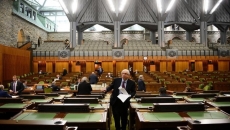A prominent cross-border lobby group wants Canada and the United States to join forces for an integrated North American approach to the new post-pandemic global economy.
The Washington-based Canadian American Business Council is building a new campaign to encourage a united economic front as the two countries battle back from the impact of COVID-19.
The goal of the "North American Rebound" campaign, to launch later Thursday, is to promote collaborative efforts to secure personal protective equipment, replenish and maintain medical stockpiles and defend mission-critical cross-border supply chains.
Expanding market opportunities in both countries would speed recovery efforts and better equip both Canada and the U.S. to compete in a dramatically different world economy, the campaign argues.
And while the Trump administration has promoted protectionism throughout the president's first term, the pandemic has fuelled nationalist sentiment in countries around the world, said Scotty Greenwood, the association's long-standing CEO and a veteran of the perpetual battle to represent Canadian interests stateside and U.S. interests in Canada.
"It's not just the U.S.," Greenwood said.
"There's a political tendency — which is understandable, but it doesn't really work — to say, 'We're going to be self sufficient, we're going to reshore everything and we're going to go it alone, we don't want to be dependent on somebody.' When you think about the Canada-U.S. context, it's not efficient, and it's not workable."
Veterans of North America's diplomatic corps, as well as business experts and scholars who specialize in Canada-U.S. matters, have been virtually unanimous over the last two months in their praise for the agreement from mid-March that prohibited discretionary travel between the countries to prevent the spread of the virus without impairing the movement of trade, business and essential workers.
Prime Minister Justin Trudeau confirmed Tuesday that the agreement would remain in place until at least June 21. But as businesses reopen and personal mobility restrictions ease on both sides of the border, talk is turning towards what it will look like when the agreement is finally allowed to lapse.
Greenwood has championed the idea of an "essential commerce traveller" program, based on existing trusted-traveller programs like Nexus and Global Entry, that would cut the risk of border officers using their broad discretion to deny access to people who should be allowed to cross.
The Canada-U.S. relationship isn't strictly a federal affair, Greenwood said — the bulk of the trade and commerce that transits the shared border tends to have the greatest impact at the regional and even local level, which is why the statement has been endorsed by more than 24 business councils, diplomats and community stakeholders on both sides.
"We know from our experience, and we know from what's happening now, that it requires a constant drumbeat reminding policymakers and reminding everybody about how truly integrated we are, and how that's a good thing."
Once it goes live, the campaign will include an online portal on the CABC website that will allow supporters to add their names to the effort.






